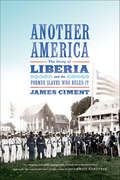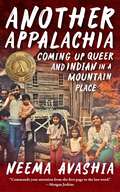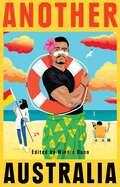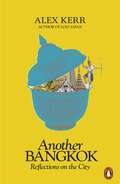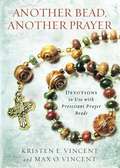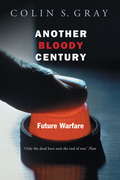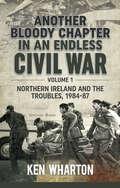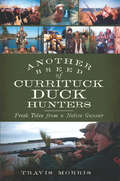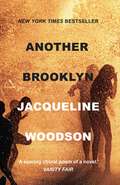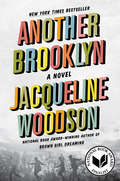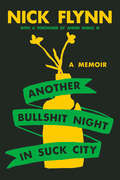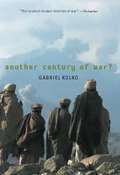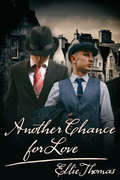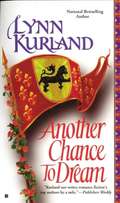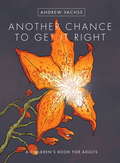- Table View
- List View
Another America: The Story of Liberia and the Former Slaves Who Ruled It
by James CimentThe first popular history of the former American slaves who founded, ruled, and lost Africa's first republicIn 1820, a group of about eighty African Americans reversed the course of history and sailed back to Africa, to a place they would name after liberty itself. They went under the banner of the American Colonization Society, a white philanthropic organization with a dual agenda: to rid America of its blacks, and to convert Africans to Christianity. The settlers staked out a beachhead; their numbers grew as more boats arrived; and after breaking free from their white overseers, they founded Liberia—Africa's first black republic—in 1847.James Ciment's Another America is the first full account of this dramatic experiment. With empathy and a sharp eye for human foibles, Ciment reveals that the Americo-Liberians struggled to live up to their high ideals. They wrote a stirring Declaration of Independence but re-created the social order of antebellum Dixie, with themselves as the master caste. Building plantations, holding elegant soirees, and exploiting and even helping enslave the native Liberians, the persecuted became the persecutors—until a lowly native sergeant murdered their president in 1980, ending 133 years of Americo rule.The rich cast of characters in Another America rivals that of any novel. We encounter Marcus Garvey, who coaxed his followers toward Liberia in the 1920s, and the rubber king Harvey Firestone, who built his empire on the backs of native Liberians. Among the Americoes themselves, we meet the brilliant intellectual Edward Blyden, one of the first black nationalists; the Baltimore-born explorer Benjamin Anderson, seeking a legendary city of gold in the Liberian hinterland; and President William Tubman, a descendant of Georgia slaves, whose economic policies brought Cadillacs to the streets of Monrovia, the Liberian capital. And then there are the natives, men like Joseph Samson, who was adopted by a prominent Americo family and later presided over the execution of his foster father during the 1980 coup. In making Liberia, the Americoes transplanted the virtues and vices of their country of birth. The inspiring and troubled history they created is, to a remarkable degree, the mirror image of our own.
Another Amy (Replica #3)
by Marilyn KayePerfect Amy Candler tries hard to blend in with everyone else, but then she comes face to face with someone who looks just like her--someone who is another Amy. The two girls look identical, and Amy expects them to have identical personalities. But she's in for a big surprise. The other Amy is determined to stand out from the crowd. She's determined to grab the spotlight, even if it means squashing the competition. She's determined not to have a look-alike, and she wants Amy out of the way. She's...well...evil! Amy must stop her, if she can.
Another Arabesque: Syrian-Lebanese Ethnicity in Neoliberal Brazil
by Karam John TofikOffering a novel approach to the study of ethnicity in the neoliberal market,Another Arabesqueis the first full-length book in English to focus on the estimated seven million Arabs in Brazil. With insights gained from interviews and fieldwork, John Tofik Karam examines how Brazilians of Syrian-Lebanese descent have gained greater visibility and prominence as the country has embraced its globalizing economy, particularly its relations with Arab Gulf nations. At the same time, he recounts how Syrian-Lebanese descendents have increasingly self-identified as "Arabs. " Karam demonstrates how Syrian-Lebanese ethnicity in Brazil has intensified through market liberalization, government transparency, and consumer diversification. Utilizing an ethnographic approach, he employs current social and business phenomena as springboards for investigation and discussion. Uncovering how Arabness appears in places far from the Middle East,Another Arabesquemakes a new and valuable contribution to the study of how identity is formed and shaped in the modern world.
Another Australia: Twelve diverse writers reveal another Australia hidden behind, beneath and beside the country we think we know.
by Sweatshop AnthologyA suburban psychic's ominous warning. A conversation in Yuwaalaraay. A glimpse of a shameful, hidden history. A love that moves a mountain. In this unwavering follow-up to After Australia, twelve more boundary-pushing Indigenous writers and writers of colour show us all that is and could exist in our versions of Australia.Featuring Shankari Chandran, Osman Faruqi, Declan Fry, Amani Haydar, Shirley Le, L-FRESH the LION, Mohammed Massoud Morsi, Omar Musa, Sisonke Msimang, Sara Saleh, Nardi Simpson and Anne Marie Te Whiu.
Another Australia: Twelve diverse writers reveal another Australia hidden behind, beneath and beside the country we think we know.
by Sweatshop AnthologyA suburban psychic's ominous warning. A conversation in Yuwaalaraay. A glimpse of a shameful, hidden history. A love that moves a mountain. In this unwavering follow-up to After Australia, twelve more boundary-pushing Indigenous writers and writers of colour show us all that is and could exist in our versions of Australia.Featuring Shankari Chandran, Osman Faruqi, Declan Fry, Amani Haydar, Shirley Le, L-FRESH the LION, Mohammed Massoud Morsi, Omar Musa, Sisonke Msimang, Sara Saleh, Nardi Simpson and Anne Marie Te Whiu.
Another Bangkok: Reflections on the City
by Alex KerrFrom the author of Another Kyoto and Lost Japan, a rich, personal exploration of the culture and history of Bangkok, and an essential guide for anyone visiting the cityAlex Kerr has spent over thirty years of his life living in Bangkok. As with his bestselling books on Japan, this evocative personal meditation explores the city's secret corners. Here is the huge, traffic-choked metropolis of concrete high-rises, slums and sky trains; but also a place of peace and grace. Looking afresh at everything from ceramics to Thai dance, flower patterns to old houses, Kerr reveals one of Asia's most kaleidoscopically complex cities. Another Bangkok will delight both those who think they know the city well and those visiting for the first time.
Another Bead, Another Prayer
by Kristen E. Vincent Max O. VincentKristen and Max Vincent invite you to pray from the heart with these 28 devotions for use with prayer beads. The devotions are grouped by 4 types of prayer: praise, confession, intercession, and thanksgiving. Excellent for those who need help focusing in prayer, for people interested in learning new ways to pray, and for groups seeking retreat options. 4 to 12 weeks Includes Leader's Guide and directions for making beads"
Another Beauty Comes into Cohabitation: Volume 1 (Volume 1 #1)
by Qing ChenyixiaoIn beijing a big city there are stories happening every day a call the debauche guy of soap just cohabit with cummer be ecstatic unexpectedly live in the home again come in a beauty let him drool lianglian big shout to get over one s head the beauty that new live in is sexy and lively after experiencing a lot of twists and turns she gives birth to sincere feeling to soap gradually autumn wave is on the move living in the same room is this the advent of happiness or the test of sexual bliss the soap of amorous flower heart should indulge with her wushan yunyu one time still sit bosom not disorderly persistence is convergent his kind girl friend is harassed make him have a headache unceasingly he was caught off guard by the twists and turns of his work those bt friends that he makes accidentally everyday happening makes a person explode laughing story which is more important passion or libido which is more tempting diligence or perdition
Another Bloody Century: Future Warfare
by Colin S. GrayHow the wars of the near future will be fought and who will win themMany nations, peoples and special interest groups believe that violence will advance their cause. Warfare has changed greatly since the Second World War; it continued to change during the late 20th century and this process is still accelerating. Political, technological, social and religious forces are shaping the future of warfare, but most western armed forces have yet to evolve significantly from the cold war era when they trained to resist a conventional invasion by the Warsaw Pact. America is now the only superpower, but its dominance is threatened by internal and external factors. The world's most hi-tech weaponry seems helpless in the face of determined guerrilla fighters not afraid to die for their beliefs.Professor Colin Gray has advised governments on both sides of the Atlantic and in ANOTHER BLOODY CENTURY, he reveals what sort of conflicts will affect our world in the years to come.
Another Bloody Century: Future Warfare
by Colin S. GrayHow the wars of the near future will be fought and who will win themMany nations, peoples and special interest groups believe that violence will advance their cause. Warfare has changed greatly since the Second World War; it continued to change during the late 20th century and this process is still accelerating. Political, technological, social and religious forces are shaping the future of warfare, but most western armed forces have yet to evolve significantly from the cold war era when they trained to resist a conventional invasion by the Warsaw Pact. America is now the only superpower, but its dominance is threatened by internal and external factors. The world's most hi-tech weaponry seems helpless in the face of determined guerrilla fighters not afraid to die for their beliefs.Professor Colin Gray has advised governments on both sides of the Atlantic and in ANOTHER BLOODY CENTURY, he reveals what sort of conflicts will affect our world in the years to come.
Another Bloody Chapter in an Endless Civil War: Northern Ireland and the Troubles, 1984–87
by Ken WhartonFour years of bloodshed in mid-1980s Northern Ireland, in the words of British soldiers who experienced it firsthand. Includes photos. Proceeding month-by-month from 1984 through 1987, this historical project provides a deep and detailed portrait of the British military experience in a period of frequent and unpredictable violence as the Provisional IRA grew in financial and logistical strength. As British Security Forces worked to contain the chaos, the Republican terror group fully embraced Danny Morrison&’s mantra— &“The Armalite and the ballot box&”—as they moved toward a realization that the British military could not be beaten, but that they could at least sit down with them from a position of strength. The goal was to keep up the pressure and force the British government to the bargaining table. But as the Provisionals and Loyalists fought, talked, and then fought again, a further 356 people died. Through oral histories, witness accounts, photos, and commentary, this book covers every major incident of the period, from the ambush of off-duty UDR soldier Robert Elliott to the bombing of Enniskillen. It also looks at the continued interference of the United States and the vast contribution of its citizens through NORAID, which ensured the killing and violence would continue. Lamenting brutality and the targeting of innocents regardless of the perpetrator&’s sympathies, veteran Ken Wharton, who has chronicled the Troubles extensively, reminds us of the universal threat, and horrifying toll, of terrorist tactics.
Another Box Set
by Elfrida Eden FallowfieldFollowing 2020’s Box Set, here is the second book of short stories by Elfrida Eden Fallowfield. What is there to discover in this new set of boxes? A touch of magic? A long hidden secret? A wicked trick? A journey back in time? These boxes may hold mystery, romance or pathos, with a touch of fear or large splashes of humour. Open Another Box Set to discover the answers.
Another Breed of Currituck Duck Hunters: Fresh Tales from a Native Gunner (Sports History Ser.)
by Travis MorrisPeople called Currituck County a sportsman's paradise back when the skies clouded over with ducks and the waters teemed with fish. The game is more elusive these days and the hunting methods more sophisticated, but native Travis Morris shows through these stories that the thrill of it all is just as intense. From a four-year-old boy on his first hunt with his grandfather to an eighty-two-year-old woman who still loves to shoot her supper, Morris highlights both the heart and humor of the sportsman. There's a three-strand cord that will forever bind Currituck gunners: passion for the hunt, love of the outdoors and respect for the dangers of open, shallow waters.
Another Brooklyn
by Jacqueline WoodsonFROM THE WINNER OF THE ASTRID LINDGREN MEMORIAL AWARD 2018 A TIME MAGAZINE TOP 10 NOVEL OF 2016 | SHORTLISTED FOR THE NATIONAL BOOK AWARD FOR FICTION 2016 They used to be inseparable. They used to be young, brave and brilliant – amazingly beautiful and terrifyingly alone. August, Sylvia, Angela and Gigi shared everything: songs, secrets, fears and dreams. But 1970s Brooklyn was also a dangerous place, where grown men reached for innocent girls, where mothers disappeared and futures vanished at the turn of a street corner. Another Brooklyn is a heartbreaking and exquisitely written novel about a fleeting friendship that united four young lives, from one of our most gifted novelists.
Another Brooklyn: A Novel
by Jacqueline WoodsonThe acclaimed New York Times bestselling and National Book Award-winning author of Brown Girl Dreaming delivers her first adult novel in twenty years.Running into a long-ago friend sets memory from the 1970s in motion for August, transporting her to a time and a place where friendship was everything--until it wasn't. For August and her girls, sharing confidences as they ambled through neighborhood streets, Brooklyn was a place where they believed that they were beautiful, talented, brilliant--a part of a future that belonged to them.But beneath the hopeful veneer, there was another Brooklyn, a dangerous place where grown men reached for innocent girls in dark hallways, where ghosts haunted the night, where mothers disappeared. A world where madness was just a sunset away and fathers found hope in religion. Like Louise Meriwether's Daddy Was a Number Runner and Dorothy Allison's Bastard Out of Carolina, Jacqueline Woodson's Another Brooklyn heartbreakingly illuminates the formative time when childhood gives way to adulthood--the promise and peril of growing up--and exquisitely renders a powerful, indelible, and fleeting friendship that united four young lives.
Another Bullshit Night in Suck City: A Memoir
by Nick FlynnThe 20th anniversary edition of "a remarkable feat: a clear-eyed, inventive, and astonishingly honest guided tour of hell." —Elissa Schappel, Vanity Fair Nick Flynn met his father when he was working as a caseworker in a homeless shelter in Boston. Another Bullshit Night in Suck City tells the story of the trajectory that led Nick and his father onto the streets, into that shelter, and finally to each other. The 20th anniversary edition, which features a foreword by Andre Dubus III, will introduce this modern classic to a new generation of readers.
Another Century of War?
by Gabriel KolkoAnother Century of War? is a candid and critical look at America's "new wars" by a brilliant and provocative analyst of its old ones. Gabriel Kolko's masterly studies of conflict have redefined our views of modern warfare and its effects; in this urgent and timely treatise, he turns his attention to our current crisis and the dark future it portends.Another Century of War? insists that the roots of terrorism lie in America's own cynical policies in the Middle East and Afghanistan, a half-century of real politik justified by crusades for oil and against communism. The latter threat has disappeared, but America has become even more ambitious in its imperialist adventures and, as the recent crisis proves, even less secure.America, Kolko contends, reacts to the complexity of world affairs with its advanced technology and superior firepower, not with realistic political response and negotiation. He offers a critical and well-informed assessment of whether such a policy offers any hope of attaining greater security for America. Raising the same hard-hitting questions that made his Century of War a "crucial" (Globe and Mail) assessment of our age of conflict, Kolko asks whether the wars of the future will end differently from those in our past.
Another Chance
by Marion Smith CollinsTheir marriage had ended, but not the love they felt for their son. And in five days one summer they discovered that their love for each other was still a powerful force. When their son was kidnapped, the years of separation fell away as Ben and Maggie Altman drew together to fight for their child. Suddenly they were closer than they'd ever been, thinking-and loving- as one. Side by side they fought to save one life so that three lives could be spent together.
Another Chance
by Shawn LaneTen years ago Aubrey St. Clair, Viscount Rothton, watched the man of his dreams Daniel Blake, the Earl of Graystone, walk out of his life after a brief sexual encounter.Now Graystone returns to London after the death of his wife, and Aubrey is given another chance with his dream man.But Daniel is determined he will have only one night of sexual bliss with Aubrey and then they must once more go their separate ways.
Another Chance For Daddy
by Patricia KnollMarriage Ties Once smitten, twice wed. She still loved him--but could she marry him again? When Clay Saunders finally realized that his adventurous life-style was no substitute for his ex-wife and son, it was too late. Rebecca was all set to marry the reliable new man in her life. Clay, she decided, would just have to accept that he'd lost her forever... Then she made the fatal mistake of taking him back for a spell while he recovered from an accident. Playing the perfect patient, Clay began his campaign to win her back! Six-year-old Jimmy clearly wanted his daddy to stay for good. Could Rebecca be persuaded to give him another chance, too? The four Kelleher women, bound together by family and love.
Another Chance To Love You
by Robin Lee HatcherRevisit this Robin Lee Hatcher story of love reunited The time had come to end the lie… Sustained by her faith, Monica Fletcher finally had the courage to tell the only man she had ever loved the secret that had burned in her heart for eleven years. The time had come to heal old wounds… When celebrity Daniel Rourke revisited Boise, Idaho, the local beauty who had been his college girlfriend turned his world upside down with the revelation that he was a father! The time was now to start over…if they could. Could his hometown sweetheart and newfound daughter find a place in the fast-paced Chicago milieu that was now Daniel's world? Only time would tell if it was possible for him to reclaim the life they should have had--and the family he had belatedly come to cherish. Originally published in 1999
Another Chance for Love
by Ellie ThomasFormer British Army Lieutenant Adam Merryweather survived the Western Front of WWI and has slowly recovered from his injuries. But can he heal from a broken heart?Torn between family duty and personal happiness, he sacrificed his love for Alf and has never ceased to regret it in the two years since the war ended.Adam is slowly putting his empty life back together, working for the family firm in the city centre of Bristol and trying to stop his mother’s meddling to find him the perfect socially acceptable bride. When he happens to meet Alf out of the blue, Adam is determined to try again. But convincing Alf to give him another chance may be too much to hope for.Can a chance meeting bring them back together? Or has Adam lost another chance for love forever?
Another Chance to Dream
by Lynn KurlandWith neither title nor land, Rhys could not win the hand of Gwennelyn of Segrave--though he would always have her heart. But Gwen was betrothed to another man, and Rhys feared he would lose her forever. But then a surprise offer came his way--bringing Rhys and Gwen a second chance at love...
Another Chance to Get It Right (2016 Edition)
by Andrew Vachss25th anniversary edition!Dark Horse is proud to offer a the 25th anniversary edition of Another Chance To Get It Right, the acclaimed and ground breaking collection of short stories, poetry, and allegory by Andrew Vachss, one of the most powerful voices in the field of child protection. This work is an illumination of the realities of child abuse, juvenile violence . . . and tribute to the power of imagination. It features a line-up of award winning artists, including Geof Darrow, Paul Chadwick, Frank Caruso, Dave Gibbons, and Tim Bradstreet, as well as all-new material plus a magnificent (and collectible) new cover by Geof Darrow.People Magazine says "Another Chance is Dr. Seuss dressed up as a Scorsese movie, another on-target hit by an author who has made children his primary concern."Another Chance To Get It Right offers a unique look at the potential of parenting, as much inspirational as it is instructional, both a blessing and a warning for us all.
